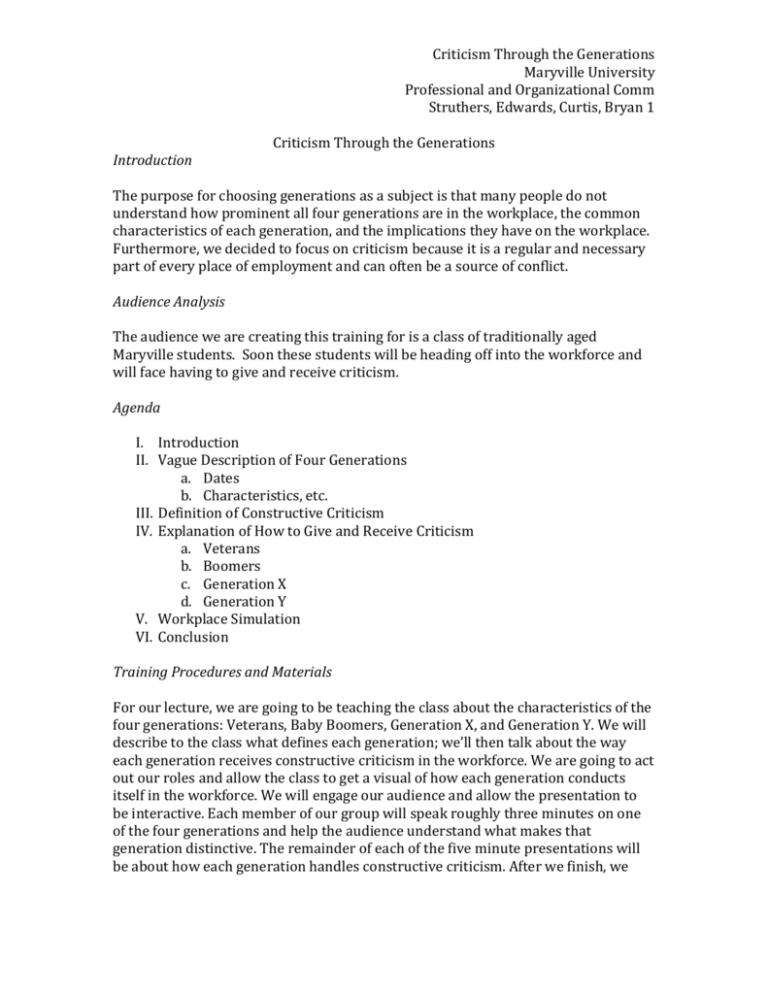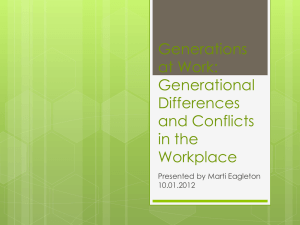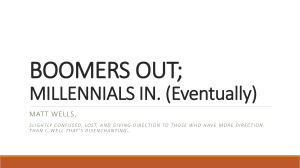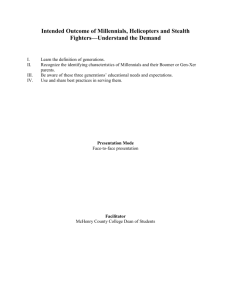Criticism Through the Generations
advertisement

Criticism Through the Generations Maryville University Professional and Organizational Comm Struthers, Edwards, Curtis, Bryan 1 Introduction Criticism Through the Generations The purpose for choosing generations as a subject is that many people do not understand how prominent all four generations are in the workplace, the common characteristics of each generation, and the implications they have on the workplace. Furthermore, we decided to focus on criticism because it is a regular and necessary part of every place of employment and can often be a source of conflict. Audience Analysis The audience we are creating this training for is a class of traditionally aged Maryville students. Soon these students will be heading off into the workforce and will face having to give and receive criticism. Agenda I. Introduction II. Vague Description of Four Generations a. Dates b. Characteristics, etc. III. Definition of Constructive Criticism IV. Explanation of How to Give and Receive Criticism a. Veterans b. Boomers c. Generation X d. Generation Y V. Workplace Simulation VI. Conclusion Training Procedures and Materials For our lecture, we are going to be teaching the class about the characteristics of the four generations: Veterans, Baby Boomers, Generation X, and Generation Y. We will describe to the class what defines each generation; we’ll then talk about the way each generation receives constructive criticism in the workforce. We are going to act out our roles and allow the class to get a visual of how each generation conducts itself in the workforce. We will engage our audience and allow the presentation to be interactive. Each member of our group will speak roughly three minutes on one of the four generations and help the audience understand what makes that generation distinctive. The remainder of each of the five minute presentations will be about how each generation handles constructive criticism. After we finish, we Criticism Through the Generations Maryville University Professional and Organizational Comm Struthers, Edwards, Curtis, Bryan 2 will ask the audience a few questions about each generation and for their impressions of them. Our goal is simply to explain each generation’s strengths and weaknesses and how their traits transcend into the workforce. Demonstrating to the audience how each generation receives constructive criticism will give them an overall understanding of why each generation has been stereotyped and help them make connections. By creating a better understanding of the four generations, we are hoping to prepare the audience to interact with all generations in the workforce in a positive manner. Creating less bias and teaching the students on how to correctly interact with individuals from specific generations is necessary. Most importantly, we will give the audience an idea on particular methods they can use in the workforce to help build a better reputation with their networks. For our presentation, we will be presenting by Power Point, so we will not need handouts for this project. As I stated before, we will ask the audience questions about each generation, in hope that they have a better knowledge of how they will operate in the workforce and in their daily lives. The only visuals we will need are the slides we created and our attire for the presentation. Millennials Since President Reagan was in office, a new generation has been born and is now beginning to enter the workforce (Behrens, 2009). The Millennials, also known as Generation Y, born between 1980 and 2000, are known to bring a very diverse set of qualities, experiences, and ways of thinking into the workplace (Stuart, Surrette & Lyons, 2008). While some refer to this generation as “Generation Next,” others perceive members of Generation Y as “Generation Whine.” (Hershatter & Epstein, 2010). Millennials are entering the workforce in record numbers, and it is important that employers understand basic characteristics of the generation and how to interact with their employees. Millennials were born into the digital age. Known frequently as “digital natives,” millennials have grown up surrounded with technology. Millennials are able to multitask, filter information, and respond to visual stimulation thanks to the constant stream of technology (Hershatter & Epstein, 2010). Millennials are able, and frequently eager, to explore new technologies and social media concepts. Being constantly connected to technology comes with downfalls. For their entire lives, Millennials have been able to rely on technology to answer all of their questions. When looking for an answer to an important question, Millennials tend to go to the internet first. If an answer is readily available, they look no further. This results in less than accurate information and gives other generations a poor impression of Millennials (Hershatter & Epstein, 2010). Criticism Through the Generations Maryville University Professional and Organizational Comm Struthers, Edwards, Curtis, Bryan 3 The product of “self-esteem parenting,” Millennials have been raised believing they can achieve anything and because of that are very focused on their own success (Stuart, Surrette & Lyons, 2008). With a strong sense of self-esteem, self-worth, and incredible determination, Millennials are often perceived as having a sense of entitlement when it comes to ‘climbing the corporate ladder’ (Stuart, Surrette & Lyons, 2008). Millennials often don’t think they are entitled, however, they just prefer a participative, flat leadership style. A final characteristic of most Millennials is the desire for structure. Most managers, teachers, and supervisors prefer employees or students who crave stability and organization; however, some managers have a different perspective. Because Millennials crave so much structure, they also need constant positive feedback and reassurance. Some managers find this quality about Millennials very draining and time consuming—counterproductive in a sense. Millennials thrive in a situation where they are able to choose the project they complete, the project has specific guidelines, and they are given the necessary materials to complete the project(Hershatter & Epstein, 2010). In conclusion, the generation born between 1980 and 2000 is very complex. Between their vast digital and technological knowledge, ability to multitask skillfully, high confidence, and desire for structure, organization and feedback, Millennials bring a wide variety of skills, ambition, ideals, and standards to their future employers. Millennials and Criticism When in the workplace, Millennials may seem to be very confident. Most Millennials, however, need constant reassurance and feedback (Hershatter & Epstein, 2010). Because Millennials were raised during a time when every accomplishment, worthy or not, was rewarded with trophies or ribbons, they are prone to asking for directions, guidance, and assurance (Hershatter & Epstein, 2010). When assigning tasks to Millennials, managers must be sure to give many options, all with specific instructions and timelines (Hershatter& Epstein, 2010). Millennials want the option to choose the project they are going to work on, and then work on their own—at a local coffee shop, at home, or on the go (Stuart, Surrette& Lyons, 2008). Millennials also crave flexibility. Working evenings or weekends is the ideal set-up for some Millennials, and they look for bosses that will accept that (Meister &Willyerd, 2010). Millennials thrive when working on projects that engage and challenge them (Hershatter & Epstein, 2010). Criticism Through the Generations Maryville University Professional and Organizational Comm Struthers, Edwards, Curtis, Bryan 4 Millennials also bring a strong sense of skepticism to the workplace. Because they have been barraged with different types of marketing and advertising techniques all their lives, Millennials tend to either ignore, or find the authentic, points in the media. Because of this, Millennials are critical thinkers—not afraid to ask questions or start a debate on a controversial topic. Millennials look for an employer who appreciates these characteristics: authenticity and honesty and will hold you to your standards once you commit to authenticity (Stuart, Surrette & Lyons, 2008). Constant and immediate feedback is something Millennials want, so it would be best for managers not to hold performance reviews or assessments unless absolutely necessary. Millennials are used to instant gratification, so a performance review will just put more stress on the Millennial employee than it would help. Instead of scheduled performance reviews, keep an open dialogue with the Millennial employee. Use constructive criticism when necessary, and be sure to praise the good outcomes frequently (Stuart, Surrette & Lyons, 2008). Finally, Millennials want clear feedback from their superiors. Managers should not try to ‘sugar coat’ things, as Millennials want a boss that will mentor and coach them (Meister & Willyerd, 2010). While Millennials want a mentor in a boss, Millennials also want to mentor others in their organization. Partnering with a senior partner or executive and showing them the ins-and-outs of social media and other technologies is an ideal way for Millennials to mentor in their company (Meister & Willyerd, 2010). Both parties are able to learn from the experience, while benefiting the company as well. Briefly, Millennials enjoy the freedom of flexible hours and work environments, but crave structured projects and timelines. Also, Millennials need frequent positive feedback and constructive criticism instead of annual performance reviews. Lastly, Millennials want clear feedback and mentoring from superiors. Not wanting to assume hidden meaning from bosses, Millennials would rather have information that is straight to the point. Generation X Generation X is classified as individuals who were born between1965 to 1980. Characteristics that identify them are the following: independent, techno-savvy, selfish, ambitious and driven. These attributes solidify their importance in the workforce and in our society. Although some of these traits are real beneficial, it also hinders their performance. Many circumstances in Generation X lives have shaped their beliefs and assumptions about other individuals and the way our society works. Criticism Through the Generations Maryville University Professional and Organizational Comm Struthers, Edwards, Curtis, Bryan 5 Generation X is a group that is very open with technology and different cultures. A key factor which allows them to be successful is their openness to diversity and their natural ability of dealing with change. Treating others with respect is very critical to being a well- rounded individual; however, this group sometimes has problems following traditions within organizations. Along with being able to go against the system, comes their desire to be very independent. Independence has taken Generation X very far in their family lives and in their careers. Generation X takes their independence to a whole new level when it involves getting tasks done in a decent and timely manner. In some cases, their independence creates selfish tendencies, which transcend onto the workforce. Due to circumstances earlier in their lives, such as taking care of themselves at a young age, many were forced to always handle situations on their own. The need for balance in their work and home lives is very important to them. Generation X emphasizes balance for more stability in their lives, because their parents lacked those traits. In need for some direction and structure, Gen X creates balance in their everyday lives which enables them to find time to enjoy themselves. Gen X is one of the first generations to be computer literate and handle technology well. Obtaining knowledge in our technologically based society really enables this group to have a very strong drive to accept change. Since they are very willing to learn and understand our fast-paced society, this generation is made up of very hardworking and dedicated workers. Generation Xers love to multi-task in every way possible; the importance of getting the job done becomes very valuable to them. The motto for Generation X is “live to work;” they don’t mind working hard to reap their rewards, but also manage to have fun in the process. Their parents, who were Baby Boomers, work to live, and the results did not always come out very positive; because they appreciate balance, implementing fun onto the workforce is needed. For this reason, financial security is a must. These characteristics increase their willingness to accomplish their goals, manage their lives in an easy manner, but also eliminate the mistakes their parents made. The continuous need for independence gives them the guidance needed to enjoy their individuality and have the best quality of life possible. Generation X and Criticism Generation X’s goal is to always maintain independence, which is good and bad when it comes to constructive criticism. In the workforce, this group would rather do things in their own manner; Generation X wants to defy the traditional rules of management. They don’t believe in regular guidelines in an organization but instead feel as though management doesn’t have their best interest at heart. Due to their beliefs that companies will corrupt them, they hold a selfish attitude. Since Generation X is very hard working, they expect to get their job done quickly. Criticism Through the Generations Maryville University Professional and Organizational Comm Struthers, Edwards, Curtis, Bryan 6 However, they often don’t receive criticism well and refrain from getting feedback from managers. An individual who is a part of this group likes to work independently, so the idea of managers hovering over them to make sure the job is done isn’t the best idea. Similar to Generation Y, they have a very short attention span, which makes them less likely to be successful on a long-term project, but they pride themselves on being able to handle multiple duties a manager assigns. A problem with constructive criticism when it comes to this group is their inability to have job security. In their minds, any job they do have is going to be temporary. For this reason, they are only at their jobs for a short amount of time. Generation X doesn’t feel like they owe their organization anything, and are only working to make a living, which is a very substantial reason why they would rather work their own way than to tolerate organizational policies. Very often as children, they saw their parents struggle, and they lost all faith in the system. Their attitude on the workforce sometimes leaves them to be very stubborn and hard to work with. Getting criticism from management would only help so much because they come into the workforce with a lack of faith in organizations. These individuals feel that the organization wouldn’t have their best interest at heart, so working alone to accomplish their goals is more acceptable. Generation X often wants to know what the company can do for them. In a sense, the organization has to continually earn their trust for them to stay dedicated. Generation X loses respect for authority figures and are unimpressed by their titles and importance to the organization. A level of arrogance may be portrayed by this generation because they are such good workers when it comes to getting the job done, but refuse to ask for help. A plethora of Generation X does not want individual’s guidance from anyone and are skilled enough to handle anything that is given to them. The ability to have freedom is very critical as well as feeling a sense of pride in what they do. The need to take charge and accomplish a task on their own makes them very good workers in spite of their opinions about how institutions are run. Though loyalty plays a huge role in becoming successful, this generation is very finicky. The characteristics that Generation X has such as flexibility, independence, selfreliance and skepticism all are factors to consider when criticism in the workforce. The individuals’ headstrong and dominant viewpoints can make it very difficult to work with them. Until Generation X can figure out a way to trust their organization, they’ll never feel comfortable dealing with criticism from authority figures. Generation X feels like they can make it to the top by themselves, without any direction from management, and, therefore, shun the idea of constructive criticism. Criticism Through the Generations Maryville University Professional and Organizational Comm Struthers, Edwards, Curtis, Bryan 7 Baby Boomer Baby Boomers make up most of the work force today and have done a lot to contribute to today’s world. Baby Boomers were born between 1946-1963 and grew up during wars and social movements that haven’t been seen since. Of the many characteristics that make up the Baby Boomer generation, the ones that stand out are their free spiritedness, their individualism, their willingness to experiment and their cynicism. Baby Boomers have contributed to the dramatic social change this country has seen in the last 20 years. Part of this is their willingness to keep working. Boomers are extremely hard working and are motivated by different positions in the workplace along with perks given out by the company and the prestige that comes with certain jobs. Boomers are very independent and self-reliant, they believe that they can do it on their own without help from others. They believe that if given the chance they can change the world and could do it without anyone’s help. Boomers have always used their status in the workplace to determine their self-worth, something other generations do not do. One of the things that make the Boomers unlike any other generation is their belief in “face time.” Boomers believe that their ability to speak to people face-to-face gives them an edge over other people. They prefer to be in the room with the person they are speaking with as opposed to calling or emailing the person. This allows them to only have to ask questions once and know exactly what it is that is expected of them. They relish the opportunity to move up in the company and think that face-to-face interaction is one of the keys to moving up in the workplace. Their willingness to try new things helps them in the workplace because they will say “yes” to jobs that younger people might say “no”. “Baby Boomers have often been called the ‘sandwich generation’ because they take care of their aging parents while also supporting their children (Answer-my-health).” Boomers are able to do this because of their refusal to stop working. Some Boomers have had jobs literally their entire lives. Their parents grew up during the great depression and the belief of hard work has been a cornerstone of their life. They in turn taught their children the meaning of hard work and dedication, which is why Boomers value their work so much. In conclusion, people born between 1946 and 1963 make-up the Baby Boomer generation; one of their core values are hard work, family life, and desire to make a difference in the world. No matter how old they are they want to make a difference and give their children a better life than they had. There is value in this because it shows that they never want to give up despite getting older. Criticism Through the Generations Maryville University Professional and Organizational Comm Struthers, Edwards, Curtis, Bryan 8 Baby Boomers and Criticism In the workplace Baby Boomers are at home; they love to work and stay busy in their lives. Most Boomers have held jobs their entire lives and find it hard to retire because they have known structure their entire lives. Some Boomers are in a state of denial about their age and simply refuse to entertain the notion of retirement. “Baby Boomers love working. They are workaholics, (Buzzle.com).” They fear lack of structure and need to complete tasks or jobs to feel a sense of self-worth. This is something that other generations have criticized; the Boomers don’t want to stop working. Other generations see the Boomers as people who don’t know when to hang up the towel. It seems like they will work till they die. This creates problems for younger generations who are ready to break into the workplace but cannot because of Boomers not wanting to retire. When criticizing a Boomer, one of the things to focus on would be their desire to work. If their age is becoming a problem in the workplace, suggest they might take a lesser role in the company. Going about this would be difficult because Boomers take so much pride in their work. When criticizing them, you should talk about how much they have given to the company and how their work effort is something to be admired throughout the company. Doing this would lessen the blow to their selfesteem and still keep them happy. Boomer’s love to feel included in the workplace, Giving criticism to a Boomer is a difficult thing to do. They take a lot of pride in their work, and the key is to not make them feel like it is a personal attack. Another criticism facing the Boomers is their independence and willingness to try new things. If their age is becoming a problem in the workplace, one could suggest something new within the company. This would play to their desire to try new things and remaining independent at the same time. By allowing them to take a different position in the company; you could solve the problem of their age while still making them feel a part of the company, even if it is in a lesser role. Independence is very important to Boomers; so when giving them criticism, make sure it is in a one-on-one environment. They value face-to-face interaction, so do not criticize them in front of other people. It should be done in private, so if they have questions or comments it can be handled in the appropriate manner. Giving criticism in the correct way is very important, especially to a Boomer, which is why face-to-face interaction is the best way to go. Baby Boomers have dominated the workplace for many years and have found it hard to change their way of life as they get older. The corporate world is changing with the times and the Boomers have kept up for a long time because of their determination to change the world, but soon they will realize that it is a young man’s game. The day will come when they will have to deal with the lazy days of retirement by finding things to occupy their time other than working in the office. Criticism Through the Generations Maryville University Professional and Organizational Comm Struthers, Edwards, Curtis, Bryan 9 Veterans The generation of Veterans, also known as Silent or Traditionalists is constructed by those who were born between the years 1912 and 1945. They can often be divided into three groups. Depression Era, born 1912 to 1921, came of age 1930 to 1939 World War II, born 1922 to 1927, came of age 1940 to 1945 Post-War Cohort, born 1928 to 1945, came of age 1946 to 1963 (Jackson, 2010). As a result of growing up during the Great Depression and World War II, it is obvious that the ways these people live their life may be different than Baby Boomers, Generation X, or Generation Y whose experiences were different nonetheless (Hammil, 2005). The times they grew up in, events they witnessed, and technology they were exposed to shaped their world view. Now in their 70’s and 80’s, there are many trends which be seen in their lifestyles as well as workplace characteristics. Veterans believe in respect for authority, conforming, and discipline. These are very traditional values as they are the oldest generation currently in the workforce. Being raised in paternalistic homes has shaped their respect for authority and submissive behaviors. They are comfortable just “fitting in” with everyone else and often keep to themselves (Hammil, 2005). The characteristics mentioned above translate to their performance in the workplace. Veterans show patterns of hard work and look at their jobs as obligations as opposed to the other generations. Those with the greatest experience in the workplace are shown respect. Because these individuals are very individualistic, that is very true of their work as well. They often work alone and send formal memos in order to contact others. Being that Veterans are concerned with fitting in, they believe “no news is good news.” They do not aim to be called out for having the most sales or creating an innovative business plan for the company, but they do find satisfaction in a job well done (Hammil, 2005). While 95% of this population is retired from the workforce, there are still some among the rest which is why it is important to consider their characteristics both in and outside the office. Keeping the Veterans in mind will help tailor the workplace to an inclusive one, especially when it comes to criticism. Veterans and Criticsm Criticism Through the Generations Maryville University Professional and Organizational Comm Struthers, Edwards, Curtis, Bryan 10 When in the workplace, Veterans often keep to themselves. They don’t normally like to be bothered unless there is a problem. If there is an issue to be addressed, however, one should still do so given the structure of the “POOP” sandwich, which is positive feedback surrounding the criticism. Because veterans are so stubborn and stuck in their ways, criticism may take a while to sink in. Because they are tech-challenged, they struggle to learn new practices. Giving them confidence and positive feedback will bring about change more smoothly. While their stubbornness may take a while to get past, Veterans’ respect for authority makes them submissive and willing to make change wherever necessary. They value respect for the experienced; thus, they expect it in criticism. One should be more formal when giving criticism to Veterans. They received a strong education in grammar in clear enunciation, and they appreciate good manners. In this way it is important to use terms such as “Mr. and Mrs.,” and “Please and thank you” (Thrash, 2009). As mentioned in the previous section, Veterans are very individualistic people. While everyone should be given criticism in private, this is especially true for the Veteran generation. They believe in the strength of face to face communication as well as the power of the individual. Many Veterans simply like to “fit in.” In this way criticisms shouldn’t be made unless necessary. They don’t expect to hear from anyone or get an evaluation unless they are actually doing something wrong. Choose battles carefully and don’t make criticizing a big deal. Clearly, the characteristics of Veterans give way to how these people desire to receive feedback. It is important to not forget about this generation because they are still a part of the workforce today. Conclusion Currently, there are four generations in the workplace, each bringing different values, ideas and experiences to the table. When giving criticism it is important to remember who you’re talking to, and no matter who it is, always do it in private and give positive feedback before and after. Some things to remember about giving criticism to people who are different generations is that Millenials want constant and immediate feedback. Generation X likes to hear not only that they are needed but they also want to know what the company can do for them. When criticizing a Baby Boomer, focus on their desire to work. For Veterans, the most important thing to remember is that respect and formality is important. Criticism Through the Generations Maryville University Professional and Organizational Comm Struthers, Edwards, Curtis, Bryan 11 References Criticism Through the Generations Maryville University Professional and Organizational Comm Struthers, Edwards, Curtis, Bryan 12 Behrens, W. (2009).Managing millennials. Marketing Health Services, 19-21. Retrieved from http://www.internationalretainedsearchassociates.com/insightresources/wp-content/uploads/2009/05/managing-millenials.pdf "Characteristics Of Baby Boomers." Characteristics of Baby Boomers. Web. 16 Apr. 2012. http://www.answer-my-health-question.info/characteristics-of-babyboomers.html “Coaching Generation X.” Center for Coaching and Mentoring. Retrieved from http://www.coachingandmentoring.com/Articles/x's.html Dhavale, Geeta. "Baby Boomer Characteristics." Buzzle.com. Buzzle.com, 21 Sept. 2011. Web. 16 Apr. 2012. <http://www.buzzle.com/articles/baby-boomercharacteristics.html>. Hammil, G. (2005). Mixing and Managing Four Generations of Employees. FDU Magazine Online, Winter/Spring 2005. Retrieved from http://www.fdu.edu/newspubs/magazine/05ws/generations.htm Hershatter, A., & Epstein, M. (2010).Millennials and the world of work: An organization and management perspective. Springer , (25), 211-223. Meister, J. C., &Willyerd, K. (2010).Mentoring millennials. Harvard Business Review, 1-4. Retrieved from http://epowerment.eqmentor.com/docs/Mentoring Millenials.pdf Stuart, A., Surrette, R., & Lyons, S. (2008). Millennials in the workplace-understanding and capitalizing on the connected generation.RobertsonSurrette, Retrieved from http://www.doitwell.ca/blog/wpcontent/uploads/Viewpoint_Millennials_in_the_workplace.pdf Thielfoldt, D & Scheef, D. (2005). Generation X and the Millenials, Retrieved from http://apps.americanbar.org/lpm/lpt/articles/mgt08044.html Thrash, C. (2009). Understanding Generations in the Workplace, Retrieved from http://www.youtube.com/watch?v=OYpwAtnywTk&feature=relmfu Jackson, J.,Veterans, Baby Boomers, Gen X, Gen Y and Gen Z, Retrieved from http://jojackson.suite101.com/veterans-baby-boomers-gen-x-gen-y-andgen-z-a185353







